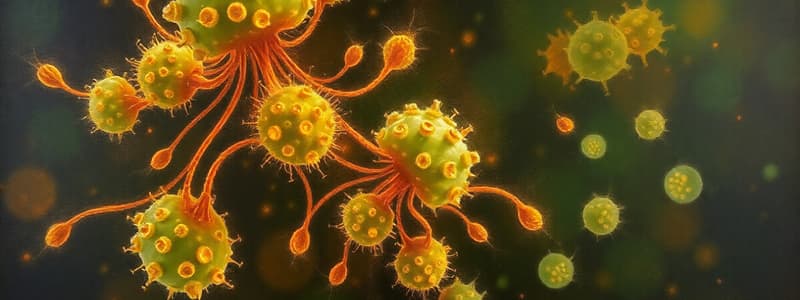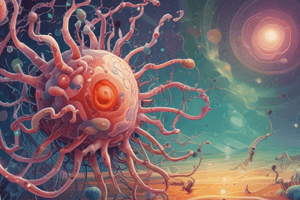Podcast
Questions and Answers
Which method is suitable for growing Mycobacterium leprae?
Which method is suitable for growing Mycobacterium leprae?
- Cell cultures
- Testes of chimpanzee
- Footpad of armadillo (correct)
- Testes of rabbits
Who was the first to propose the theory of biogenesis?
Who was the first to propose the theory of biogenesis?
- Louis Pasteur (correct)
- John Tyndall
- Anton Leeuwenhoek
- Rudolf Virchow
What is the correct temperature and duration for the pasteurization process?
What is the correct temperature and duration for the pasteurization process?
- 63-65C for 30 seconds
- 73-75C for 15 seconds
- 73-75C for 15 minutes (correct)
- 63-65C for 30 minutes
Who developed the Tuberculin test?
Who developed the Tuberculin test?
Which of the following statements about pathogens is incorrect?
Which of the following statements about pathogens is incorrect?
Microorganisms that are responsible for decomposing dead bodies are known as?
Microorganisms that are responsible for decomposing dead bodies are known as?
The process involving microorganisms to decompose industrial waste is referred to as?
The process involving microorganisms to decompose industrial waste is referred to as?
What term refers to the count of indigenous microflora compared to body cells?
What term refers to the count of indigenous microflora compared to body cells?
Which organism is not a suitable host for growing Mycobacterium leprae?
Which organism is not a suitable host for growing Mycobacterium leprae?
Which scientist is incorrectly associated with the development of the Tuberculin test?
Which scientist is incorrectly associated with the development of the Tuberculin test?
What is an incorrect statement about the process of pasteurization?
What is an incorrect statement about the process of pasteurization?
Which of the following statements about indigenous microflora is false?
Which of the following statements about indigenous microflora is false?
Which of these is not a characteristic of opportunistic pathogens?
Which of these is not a characteristic of opportunistic pathogens?
Which of the following is not associated with the decomposition of industrial waste?
Which of the following is not associated with the decomposition of industrial waste?
Which option reflects a misconception about pathogens?
Which option reflects a misconception about pathogens?
Which answer inaccurately describes the count of indigenous microflora in relation to body cells?
Which answer inaccurately describes the count of indigenous microflora in relation to body cells?
Which of the following correctly identifies a method for growing Mycobacterium leprae?
Which of the following correctly identifies a method for growing Mycobacterium leprae?
Which scientist is known for proposing the theory of biogenesis?
Which scientist is known for proposing the theory of biogenesis?
What is the temperature and duration effective for pasteurization?
What is the temperature and duration effective for pasteurization?
Which of the following is NOT a scientist associated with the development of the Tuberculin test?
Which of the following is NOT a scientist associated with the development of the Tuberculin test?
Which statement about pathogens is incorrect?
Which statement about pathogens is incorrect?
Which group of microorganisms is responsible for the decay of dead bodies?
Which group of microorganisms is responsible for the decay of dead bodies?
Which term best describes the use of microorganisms in the decomposition of industrial wastes?
Which term best describes the use of microorganisms in the decomposition of industrial wastes?
What is typically true about the count of indigenous microflora in comparison to body cells?
What is typically true about the count of indigenous microflora in comparison to body cells?
What is the primary method for culturing Mycobacterium leprae?
What is the primary method for culturing Mycobacterium leprae?
Which scientist is most commonly associated with the theory of spontaneous generation?
Which scientist is most commonly associated with the theory of spontaneous generation?
Which temperature and duration combination is involved in pasteurization?
Which temperature and duration combination is involved in pasteurization?
Which statement accurately defines opportunistic pathogens?
Which statement accurately defines opportunistic pathogens?
Which group of microorganisms is known for their role in nutrient cycling through decomposition?
Which group of microorganisms is known for their role in nutrient cycling through decomposition?
In what context is bioremediation utilized?
In what context is bioremediation utilized?
What is a common misconception about the prevalence of pathogens among microorganisms?
What is a common misconception about the prevalence of pathogens among microorganisms?
Which statement regarding the indigenous microflora is incorrect?
Which statement regarding the indigenous microflora is incorrect?
Which organism is not typically considered for the cultivation of Mycobacterium leprae?
Which organism is not typically considered for the cultivation of Mycobacterium leprae?
What is the significance of the Pasteurization process at 63-65°C for 30 minutes?
What is the significance of the Pasteurization process at 63-65°C for 30 minutes?
Which statement about opportunistic pathogens is least accurate?
Which statement about opportunistic pathogens is least accurate?
Which of these microorganisms is incorrectly associated with their function in decomposing matter?
Which of these microorganisms is incorrectly associated with their function in decomposing matter?
What method is least appropriate for identifying indigenous microflora in the human body?
What method is least appropriate for identifying indigenous microflora in the human body?
In which context is the term bioremediation specifically applied?
In which context is the term bioremediation specifically applied?
Which scientist is incorrectly linked with the establishment of the germ theory of disease?
Which scientist is incorrectly linked with the establishment of the germ theory of disease?
What misconception might exist regarding the prevalence of pathogens among all known microorganisms?
What misconception might exist regarding the prevalence of pathogens among all known microorganisms?
Flashcards
Mycobacterium leprae growth
Mycobacterium leprae growth
Mycobacterium leprae can be cultured in the footpad of an armadillo.
Biogenesis theory proponent
Biogenesis theory proponent
Rudolf Virchow proposed the theory of biogenesis.
Pasteurization temperature
Pasteurization temperature
Pasteurization involves heating at 63-65°C for 30 minutes.
Tuberculin test developer
Tuberculin test developer
Signup and view all the flashcards
Microbe type causing disease
Microbe type causing disease
Signup and view all the flashcards
Microbe category for waste breakdown
Microbe category for waste breakdown
Signup and view all the flashcards
Microbes in waste treatment
Microbes in waste treatment
Signup and view all the flashcards
Indigenous microflora count
Indigenous microflora count
Signup and view all the flashcards
Who proposed the theory of biogenesis?
Who proposed the theory of biogenesis?
Signup and view all the flashcards
What is pasteurization?
What is pasteurization?
Signup and view all the flashcards
How can Mycobacterium leprae be grown?
How can Mycobacterium leprae be grown?
Signup and view all the flashcards
Who developed the tuberculin test?
Who developed the tuberculin test?
Signup and view all the flashcards
What are opportunistic pathogens?
What are opportunistic pathogens?
Signup and view all the flashcards
What are saprophytes?
What are saprophytes?
Signup and view all the flashcards
What is bioremediation?
What is bioremediation?
Signup and view all the flashcards
Explain the relationship between indigenous microflora and body cells.
Explain the relationship between indigenous microflora and body cells.
Signup and view all the flashcards
Biogenesis
Biogenesis
Signup and view all the flashcards
Pasteurization
Pasteurization
Signup and view all the flashcards
Tuberculin test
Tuberculin test
Signup and view all the flashcards
Grow Mycobacterium leprae
Grow Mycobacterium leprae
Signup and view all the flashcards
Pathogens
Pathogens
Signup and view all the flashcards
Opportunistic pathogens
Opportunistic pathogens
Signup and view all the flashcards
Saprophytes
Saprophytes
Signup and view all the flashcards
Bioremediation
Bioremediation
Signup and view all the flashcards
Who proposed biogenesis?
Who proposed biogenesis?
Signup and view all the flashcards
Pasteurization process
Pasteurization process
Signup and view all the flashcards
Biogenesis theory
Biogenesis theory
Signup and view all the flashcards
Study Notes
Introduction to Microbiology
- Theory of biogenesis: Proposed by Louis Pasteur
- Pasteurization process: 63-65°C for 30 minutes
- Tuberculin test developer: Anton Leeuwenhoek
- Koch postulates exceptions: Synergistic infections
- Mycobacterium leprae growth: Can't be grown in vitro
- Microbe truth: Pathogens are not 87% of all microorganisms
- Microorganisms in decomposition: Microorganisms are responsible for decaying dead bodies (saprophytes)
- Microorganism use in waste: Bioremediation uses microorganisms
- First to see live bacteria: Anton Leeuwenhoek
Studying That Suits You
Use AI to generate personalized quizzes and flashcards to suit your learning preferences.




